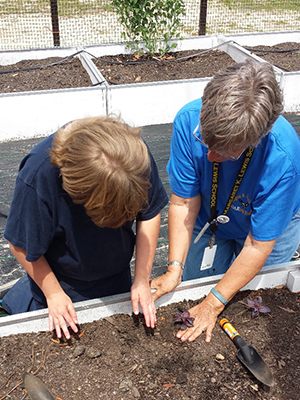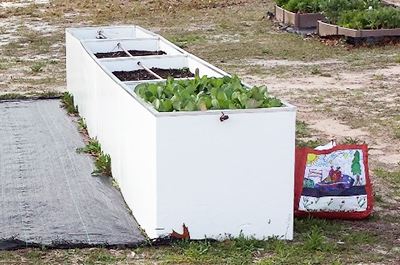Helping Students Grow in Bay County

A student prepares to work in the garden soil with a teacher.
The Florida Master Gardener Award of Excellence for Service to 4-H and/or Other Youth recognizes Master Gardener volunteers who make outstanding contributions to youth through horticulture. Last October, the 2015 award went to the UF/IFAS Extension Bay County Master Gardener volunteers for their part in a community-wide school gardening program.
Located in Panama City, Florida, the Margaret K. Lewis School serves approximately 150 students with disabilities, in grades from pre-K through high school.
The project began as a way of providing horticultural therapy and to assist youth in developing life skills. Some of Margaret K. Lewis' students have profound motor skill challenges, or are sensitive to sensory stimulation (afraid to touch soil or become dirty, for example), while others are challenged by the thought of trying new things, or are unable to stay on task and complete a project.
In August of 2013, seven Bay County Master Gardener volunteers partnered with a number of local groups to start the gardens. Judy Stevens was the program leader responsible for planning, organizing, and implementation. Janet Psikogios provided administrative and technical computer support. Along with Dee Jones, Vicki Wahl, Dena DiFilippo, Norman Shiver, and Michele Rigdon, they provided assistance to the youth during activities.
The Master Gardener volunteers worked with the school's teachers to identify gardening activities that could improve motor skills, provide opportunities for sensory exploration, build confidence, self-esteem, and patience, as well as increase the students' sense of responsibility.
The garden is made up of fourteen 4 x 4 foot beds and eight taller, 2 x 4 foot beds that are accessible by wheelchair. Students were involved in all stages of gardening, from preparing beds, planting vegetable seeds and seedlings, maintaining the gardens, to harvesting the produce. They even assisted in the preparation of their harvest. The students learned about gardening tools and safety. Chores like weeding provided an opportunity for youth to explore the soil and plant parts while developing motor skills; some activities included hand-over-hand assistance for students with physical limitations. Students learned about wildlife, such as the life cycle of frogs and butterflies.
Between August 2013 and July 2015, the Master Gardener volunteers contributed over 600 hours and traveled nearly 700 miles.
Positive Outcomes
School Principal Lori Hast and Assistant Principal Deborah Dixon both praised the program. "Students are engaged in every phase of the gardening process," Principal Hast wrote in a commendation letter. "From the garden to the table, our students learn to appreciate homegrown fruits and vegetables."
Working in the garden has helped students embrace different textures and foods. Initially, many would not touch the soil, even with gloves—now the majority have their bare hands in the soil. They're open to new foods—because they helped grow them. One example the teachers gave was a student now willing to eat a variety of vegetables: eggplant, squash, peppers, and tomatoes; in the past, he wouldn't even consider these to be an acceptable part of his diet.
Gardening has also helped students overcome shyness, improve independence, develop patience, improve self-confidence, and demonstrate responsibility. It's even helped improve classroom behavior. Teachers consider the garden a "Positive Behavioral Support" because the students place such great value on going outside with the Master Gardener volunteers. One student, who had such extreme anxiety and aggression that he often ran away from school, has now become motivated to stay engaged in school activities, all so that he can go outside and participate in gardening.
A high school teacher at the school, Rita Carlson, observed that "the gardening program has truly made a difference in our students with autism, as well as the students with other disabilities. The students look forward to planting, growing, harvesting, and eating the crops they grow and take great pride in their gardening skills."
Improvement in motor skills has been seen. While all students participated in the garden, some required "hand over hand" assistance, due to limited mobility. One wheelchair-bound student, considered "profound" (meaning not mobile with very limited use of body), was able to reach in the garden, grab the soil, and bring it to her face. She had never shown an ability to grab the soil—or much else—before. For the teachers, this was a very exciting breakthrough.
One parent of a student wrote that her son, who has Down Syndrome, "benefited learning that it takes team work to tend the garden with chores of weeding, watering and feeding the plants as they grow." She went on to praise those teaching the students, writing, "I applaud Judy Stevens and the staff at Margaret K. Lewis School for offering this gardening program."

A raised planting bed accessible by wheelchair.

